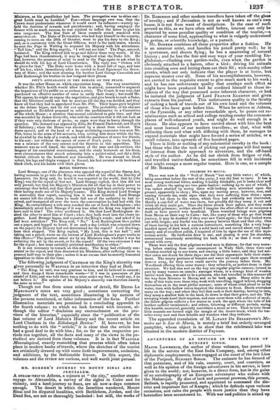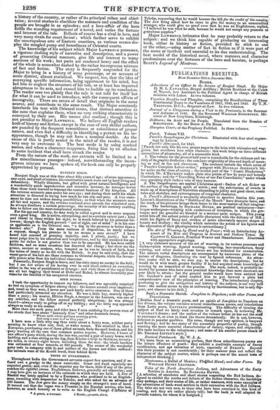ADVENTURES OF AN OFFICER IN THE SERVICE OF RUNJEET SINGH.
MAJOR LAWRENCE, the author of these volumes, has passed his life in the service of the East India Company, and, among other diplomatic employments, been engaged at the court of the late Lion of the Punjaub, BUNJEET SINGH. The estimate he has formed of that potentate, and of his rule, country, court, and courtiers, as well as his opinion of the foreign adventurers in his service, is here given to the world; not, however, in a direct form, but in the guise of an autobiography of an European adventurer who enlists with the Maharajah. By dint of luck and personal prowess, this person, Bellasis, is rapidly promoted, and appointed to command the dis- trict and important fort of Kangra ; which he defends upon various occasions, and rules the people with more justice than they have heretofore been accustomed to. With war and politics is mixed up
a history of the country, or rather of its principal tribes and chief- tains; several stories to elucidate the manners and condition of the people are brought in as episodes; and a love-affair of the hero fulfils the standing requirement of a'novel, and varies the fortune and interest of the tale. Bellasis of course has a rival in love, and very many rivals for court favour ; which further serve to exhibit the unscrupulous arts of Eastern courtiers, as various scenes dis- play the mingled pomp and homeliness of Oriental courts.
The knowledge of his subject which Major LAWRENCE possesses, a vigorous dashing style of narrative and description, and a power of presenting Oriental manners, give life and interest to many sections of his work ; but parts are rendered heavy and the effect of the whole is somewhat dashed by the rather incongruous mixture of fact and fiction. The story is frequently suspended for the Major to bring in a history of some personage, or an account of some district, almost statistical. We suspect, too, that the idea of conveying specific information, being uppermost in his mind, has led him to neglect the structure of his tale, or at least has imparted abruptness to its acts and caused him to huddle up its conclusion. The reader sees too plainly that the tale is not told for itself but for what it can be used to introduce, with the consequent effects of incongruity. There are errors of detail that originate in the same source, and contribute to the same result. The Major constantly interlards his text with Oriental terms, that distract attention to the note that explains them, when no very striking characteristic is conveyed by their use. His names also confuse ; though this is not peculiar to Major LAWRENCE. We believe all English readers both of history and fiction, except in the case of very skilful authors, are puzzled by the frequent resemblance or coincidence of proper names, and even feel a difficulty in identify ing a person on his re- appearance though he may not have a nominal double. As the cause of this is partly seated in the mind of the reader, it is not very easy to overcome it. The best mode is by using marked names, and when a character reappears, fixing him by an allusion to some incident that shall have struck the reader.
From the nature of the work, our extracts will be limited to a few miscellaneous passages : indeed, notwithstanding the incon- gruous mixture we have spoken of, the book can only be properly appreciated by perusal.
BUNJEET BUNJEET
Runjeet Singh was at this time about fifty years of age ; of mean appearance, one-eyed, and small of stature, his constitution much worn out by hard living and debauchery. Wholly illiterate, but gifted with great natural intelligence and a wonderfully quick apprehension and retentive memory, he manages better than those more learned to transact the current business of his kingdom. All the revenue-accounts pass under his own eye ; and during their audit his whole attention is directed to trying how much he can clip and pare. A true state- ment he does not reckon among possibilities ; so that when the accounts seem all fair and square, and the revenue rendered even exceeds the stipulated sum, he &Ways disallows a certain percentage, the tenacity of his memory enabling him to follow out the most complicated statements. For his age and country, he may truly be called a great and in some respects even a good king. Be is active, enterprising, and to a certain extent just ; kind and liberal to those within his sight, he is much beloved by his personal fol- lowers; though the English proverb " out of sight, out of mind" is in his case as applicable as is the Oriental one, " a dog in the presence is better than a brother afar." From the same easiness of disposition, he rarely refuses a request, though his promise is by no means a sure sunud.* 1 have heard him accused of grasping rapacity, and, I admit, justly ; but we must judge him by his education and temptations, and by this standard his ap- petite for riches is not greater than was to be expected. He has been called faithless, and on some occasions has deserved the charge ; but show me the prince, ancient or modern, who, tempted as be was to breach of faith, kept the terms of treaty as he did with the British. It may be said truly, that the worst parts of his rule are those common to Oriental despots, while the favour- able points arise from his individual character. Personally, Runjeet Singh is brave, and has slain many an enemy in the field ; but I am not aware of his having ever in cold blood ordered an execution, tither in the way of punishment or revenge : and while those of the royal blood are all but begging their bread at Delhi and Kabul, lie almost invariably pro- vides for the families of his conquered enemies.
SIKH PONIES.
I took the opportunity to inspect my followers, and was agreeably surprised to find no symptom of fatigue among them : the horses seemed even improved ; and, small as they were, I never saw such hardy active creatures. One of them bad particularly attracted my attention. He was a little bay, scarcely higher than a pony ; his master, Hakim Singh, a trooper in the Lancers, was one of my orderlies, and the fellow seemed perfectly ubiquitous: be was always hazirf —always ready to gallop off at my bidding ; and the little nag appeared always as ready as his master. • • • More than one such pony and rider have I seen outdoing the powers even of the steeds that bore about "heavenly Una" and other damosels errant,
" Whose milk-white palfreys scorning grass, Just crop a rose-leaf as they pass."
I have seen a little wiry nag thus carry about a heavy man, neither party seeming to know what rest, food, or water meant. The mischief is, that a European, purchasing one of these gifted animals, finds the spell broken' and his 'pony wanting all the care that common ponies require. However, I know of one officer's pony which, during the late war, carried a pair of heavy boxes, with bedding, and a man sitting on the top, from Khelat-i-Gilji to Mokhoor, seventy- six miles, in twenty-eight hours, including three for rest : the whole burthen was estimated at four maunds, or 320 pounds. The owner of the wonderful pony rode in company with it, and neither of the horses nor riders suffered: the animals were of the Kozak breed, from behind Kiva.
TESTS OF ENGLISHMEN.
Throughout India the Government servants expect free quarters, and if re- fused owe a grudge to the stout zurnindar. Grass and wood especially are expected gratis; and, even if the superior pay for them, little if any of the price treadles the rightful owner. Englishmen, however, generally act otherwise ; and I may here give an instance of the estimate in which they are held. A Jew of Mesbid was lately applied to by a European, who professed to be an English- man, travelling with despatches to Tehran, and who asked for an advance of 500 ducats. The Jew gave the money simply on the stranger's note of hand. It turned out that the rogue was a Prussian in the Russian service, who had, however, so much honesty as to write to the English Charge d'Affaires at • A grant, a warrant. Ready, 1rsent, aleit. Tehran, requesting that he would honour the bill for the credit of his country. - The Jew being asked how he came to give the money to an unaccredited stranger, who could give no proof even that be was an Englishman, replied, "I believed he was what he said, because he would not accept any presents or gratuitous supplies." Major LAWRENCE intimates that he may probably return to the subject : and we think him capable of producing an interesting book, either in history or fiction, provided he stick to one or the other,—using matter of fact in fiction as if it were part of the scene or incident and essential to its due understanding. The best model of the historical novel, where manners and character predominate over the fortunes of the hero and heroine, is perhaps SCOTT'S Legend of Montrose.























 Previous page
Previous page